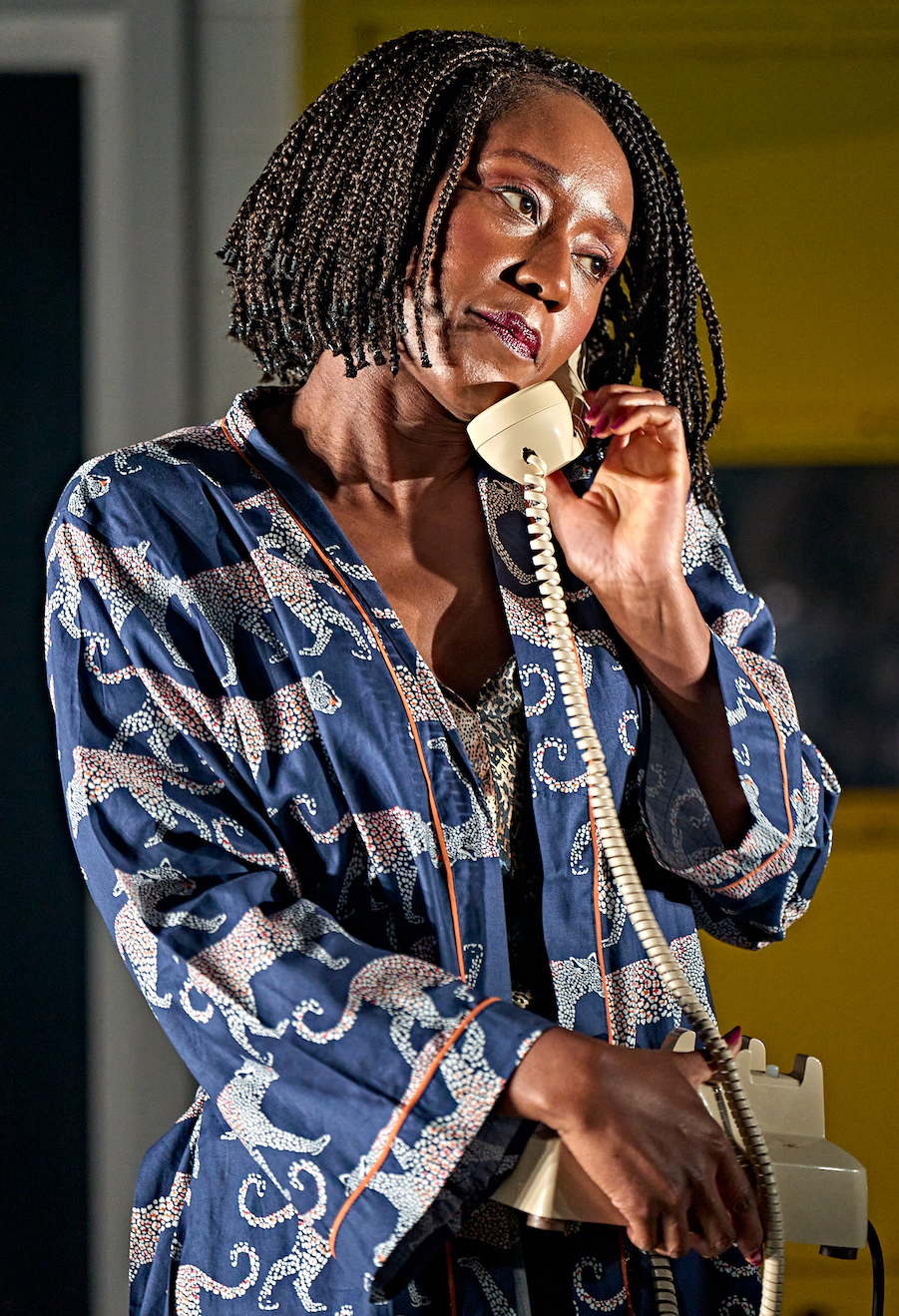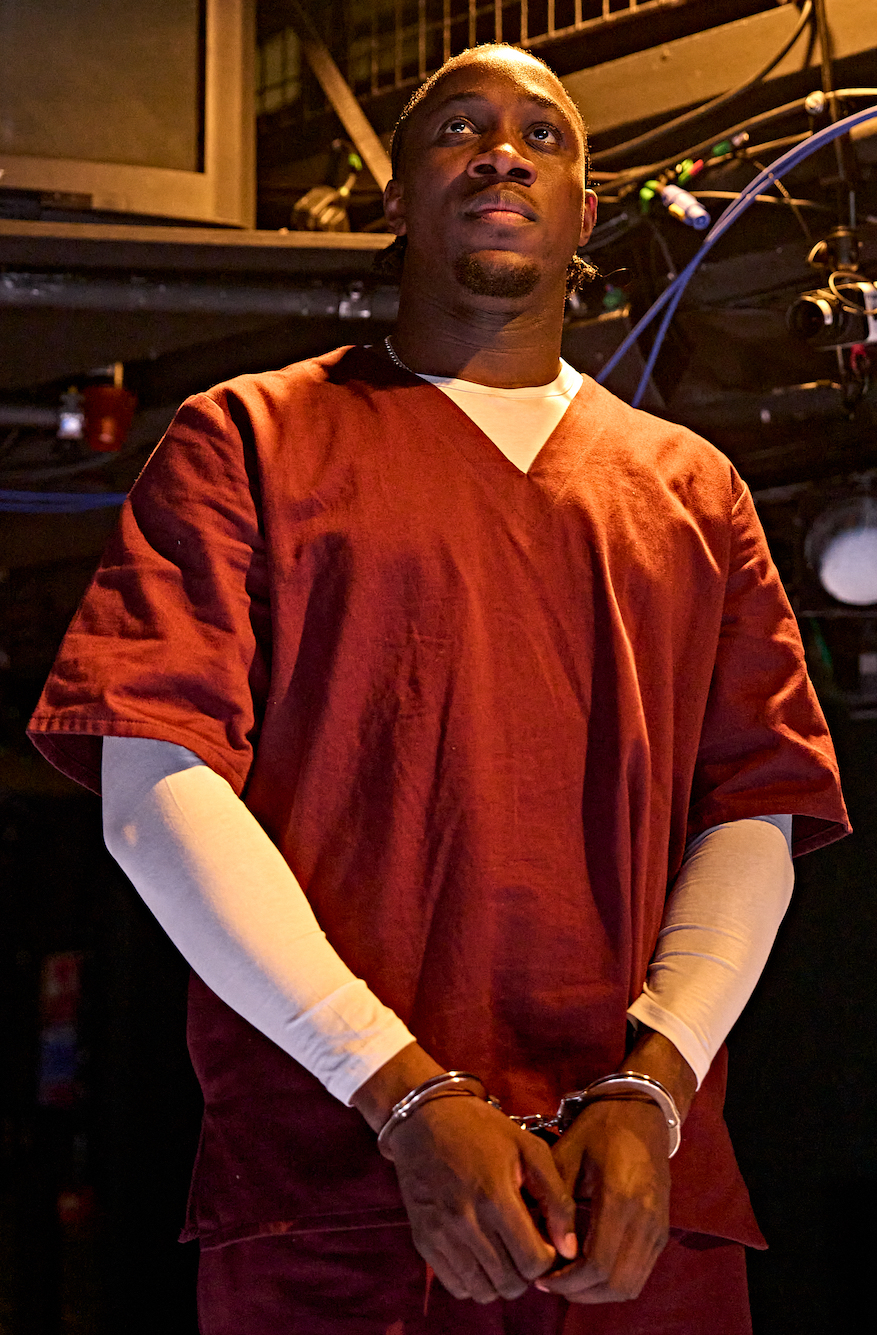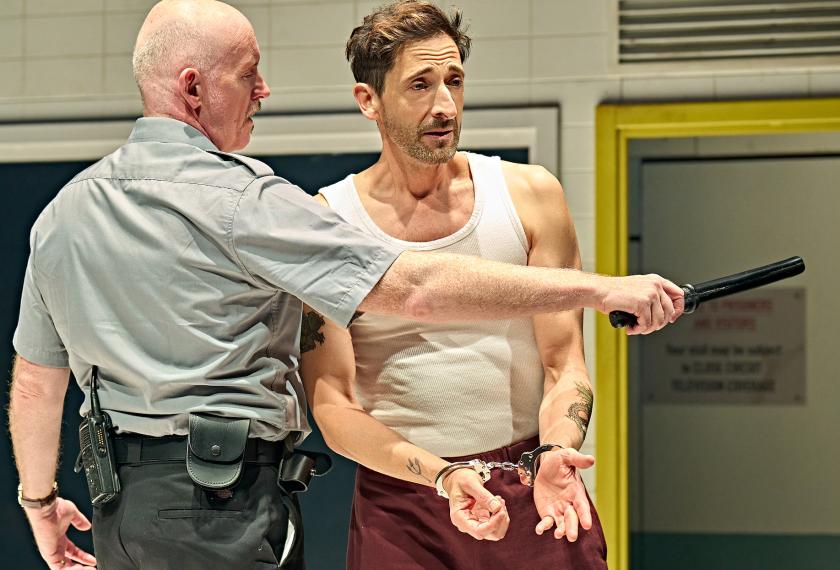There is star casting, and there is casting the right star – not the same thing. The Donmar’s new production, The Fear of 13, succeeds in the latter category, in spades.
The star in question is Adrien Brody, a child actor who left stage work for the cinema more than three decades ago, where he became the youngest recipient of the Best Actor Oscar for The Pianist. More recently, he has also graced premium television series such as Succession and Peaky Blinders. At the Donmar he has been allied to the director Justin Martin, an award-winner for Prima Facie, Stranger Things and The Jungle, a production about the makeshift migrant camp near Calais that proved how effectively he could use minimal means and an ensemble cast.
So it proves at the Donmar, whose every crevice seems to have been exploited as playing and viewing space. In the centre is a raised square the same size as the cell Brody’s character, Nick Yarris, was consigned to for 22 years on a Pennsylvania death row, for a crime he didn’t commit. Around three sides of the stage is a raised walkway, and between it and the stage are two rows of chairs with stencilled numbers on their backs, like seating in a prison visitors’ room; members of the audience sit here, sometimes alongside members of the cast. Along the back wall is a glass box in which scenes outside the “cell” can be lit up and staged. This superb design, crucial to the fluid functioning of the play, with the cast constantly moving around it, is by Miriam Buether.
The audience is also seated high up towards the ceiling, even on the back wall, like students in an anatomy theatre, and the autopsy they have come to watch is a forensic analysis of how Yarris came to be a victim of such a gross injustice. The dialogue zigzags across his life, as he tells his story to a PhD student, Jackie Schaffer (excellent Nana Mensah, pictured below), doing research on death row inmates, who becomes intrigued with his case, finally arriving at the traumatic event in his childhood that taught him to lie to survive. Together, Yarris and Schaffer try everything the system allows to get his case re-examined, seemingly saved when DNA testing is developed. But it’s a false dawn, and Yarris must wait another mind-blowing decade for a positive development.
 Yarris is no stereotypical lunk with a temper who landed one bad punch. He has talked himself into his dire predicament while under the influence of metamphetamines, in a dopey attempt to help the police with a gruesome rape and murder case and secure his freedom for a minor car theft. Instead he became the prime suspect in the murder, sentenced to death without any physical evidence being presented in court. Apart from a brief few weeks when he earned the nickname Harry Houdini and escaped custody – fleeing first to New York, where he cycled around on a “boosted” bike, then to Orlando, where he was rearrested and put in a facility with the notorious serial killer Ted Bundy – Yarris has submitted to his fate with a dark humour rooted in an increasing sense of the absurd.
Yarris is no stereotypical lunk with a temper who landed one bad punch. He has talked himself into his dire predicament while under the influence of metamphetamines, in a dopey attempt to help the police with a gruesome rape and murder case and secure his freedom for a minor car theft. Instead he became the prime suspect in the murder, sentenced to death without any physical evidence being presented in court. Apart from a brief few weeks when he earned the nickname Harry Houdini and escaped custody – fleeing first to New York, where he cycled around on a “boosted” bike, then to Orlando, where he was rearrested and put in a facility with the notorious serial killer Ted Bundy – Yarris has submitted to his fate with a dark humour rooted in an increasing sense of the absurd.
To block out the brutalising impact of prison life, he reads like a fiend, hundreds of books a year, looking up words he doesn’t know – “incredulous” is a favourite, as is “triskaidekaphobia”, hence the play’s title. He and his female visitor bond when she spots he is trying to pass off Holden Caulfield’s story as his own. “I have never met anybody who has read Catcher in the Rye,” he tells her. She slams back with, “I have never met anybody who hasn’t.” Lindsey Ferrentino’s script, with Yarris as consultant, delivers zingers like this at every turn, so that the piece has an unexpected comic dimension, as well as an earnest one,
The affection that blossoms between the unlikely pairing of prisoner and visitor is a key strand in the play, but not the only one. Playing all the other parts – inmates, judges, lawyers, policemen, guards, family members – buzzing in and out of the action is a terrific ensemble cast who can sing as well as they act. Death row prisoners at this facility aren’t allowed to talk to each other at all so the prison choir is a safety valve of a crucial kind. The a cappella close harmonies the actors produce is balm to the soul. Especially beautiful is the voice of Posi Morakinyo (pictured below), which sounds out in a duet with his lover (Tommy Sima’an), flowers on a dung heap.
 Words are ultimately the tools Yarris will use to secure his release, in the carefully phrased letter he uses to a judge, begging for his torment to end and requesting his right to be executed. Yarris's guard (Aidan Kelly), faced with the sobering fact that a man in his care has been wrongly denied his liberty for 22 years, calls him by his name now, not his number, and hands him a towel he has specially warmed. The piece ends powerfully and lyrically in spring sunshine, in a world where people think it isn’t going to rain.
Words are ultimately the tools Yarris will use to secure his release, in the carefully phrased letter he uses to a judge, begging for his torment to end and requesting his right to be executed. Yarris's guard (Aidan Kelly), faced with the sobering fact that a man in his care has been wrongly denied his liberty for 22 years, calls him by his name now, not his number, and hands him a towel he has specially warmed. The piece ends powerfully and lyrically in spring sunshine, in a world where people think it isn’t going to rain.
Yarris knows otherwise. Brody doesn’t look anything like him, but he seems to inhabit his personality, which mixes boyishness with an almost literary embrace of his own life story. We believe Yarris was a tearaway who got into drugs too early and drifted into petty crime; but we also accept that he has come to think and talk like a writer, which Brody delivers without a hint of pretension. His face, with its characterful eyebrows, was built for pathos, his rangey physique to embody suffering; but here his features can also radiate a sunny kind of joy as Yarris discovers love, and that freedom means the freedom to love. His liberation moves us not just because it is a victory for justice-seekers but because it represents the triumph of the inner man as well. And Brody effortlessly convinces us that this extraordinary inner man exists. A magnificent achievement from all concerned.















Add comment